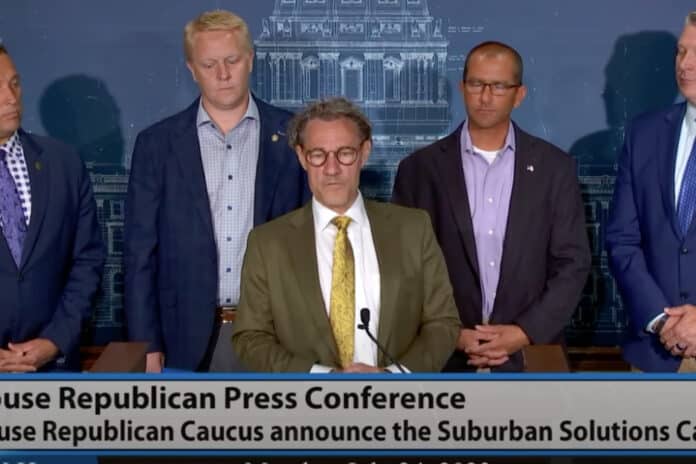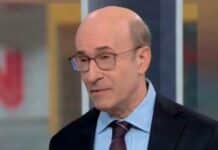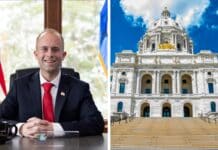
A group of first-term Republican legislators — who all hail from different corners of the Twin Cities metro — have formed a caucus they say will aim to speak up for suburban voters whose collective voice has been drowned out by the increasingly urban-dominated influences of the DFL majority at the Capitol.
On Monday morning, Rep. Danny Nadeau, R-Rogers, led the cadre of six freshmen state representatives in a Capitol press conference to announce the formation of the Suburban Solutions Caucus.
“The suburbs and the urban core are very different,” said Nadeau, who worked in both county and state government before running for the legislature in 2022. “What people find important is different. Not that one is right and one is wrong. We just feel the suburban voice, that value system that comes from the suburbs, has kind of been lost; and we want to make sure that comes back (at the legislature).”
The new caucus also includes state representatives: Mark Wiens of Lake Elmo, Shane Hudella of Hastings, Andrew Myers of Tonka Bay, Ben Bakeberg of Jordan and Jeff Witte of Lakeville.
While three of the six members of the Suburban Solutions Caucus represent fairly “safe” seats heading into the 2024 election cycle, three others — Wiens, Hudella and Witte — won their elections by a margin of 3 percent or less.
Myers, who represents a number of west metro communities that skirt Lake Minnetonka, said his constituents have made it clear they want their elected representatives to find reasonable solutions for families and businesses over one-sided agenda setting.
“Seeing what has happened down here in those committees, on the session floor, we do try to reach across the aisle,” said Myers, a married father of four, small business owner and former Minnetonka Beach City Council member. “We know that the feedback is that the voices are getting muted in the suburbs. So if we can step up and represent those voices, that’s what we want to do.”
Bakeberg, a former public school principal, said he anticipates that the caucus of a half dozen will grow in the coming months as his House colleagues hear more from their constituents about the DFL majority’s efforts to spend all of the state’s $20 billion surplus and then raise taxes by $10 billion.
“That’s not what I heard when I was knocking on doors,” Bakeberg said. “A large part of Minnesota was left out of [the conversation] during this past legislative session.”
Nadeau echoed those sentiments and said the approach the Suburban Solutions Caucus will take will be needed more than ever during the next legislative session, considered a bonding year of the 2023-2024 biennium.
“One might argue that maybe if we felt like we had a place at the table the last six months, we wouldn’t feel so strongly that we needed to band together in order to try to have a louder voice,” Nadeau said. “There was an agenda that was pushed [by the DFL trifecta]. And it really didn’t matter [to them] if our voices weren’t heard. That’s what you get. There’s no single organization, no single party, no single person that has all the right answers. And in the last legislative session there was one focus, one agenda and it moved through.
“We want to create a strong voice that carries better representation for the areas we serve,” he added.
Hank Long
Hank Long is a journalism and communications professional whose writing career includes coverage of the Minnesota legislature, city and county governments and the commercial real estate industry. Hank received his undergraduate degree at the University of Minnesota, where he studied journalism, and his law degree at the University of St. Thomas. The Minnesota native lives in the Twin Cities with his wife and four children. His dream is to be around when the Vikings win the Super Bowl.











